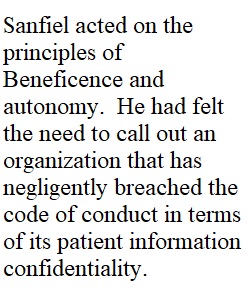


Q Part I: Sanifel v. Department of Health Ethical Dilemmas: a. What principle(s) (described in pages 10-21) did each of the following demonstrate. Provide facts to explain why you picked the principles you selected: (1) Sanfiel- (2) The State Board of Nursing- b. What virtues and values (pages 22-38) do you think each of the following held? Provide facts to explain why you picked those virtues and values. (1) Sanfiel: (2) The State Board of Nursing- (3) Charter- (4) The news media- Part II: Ethical Reasoning Exercise Assume you are Sanifel and you just discovered the computer. Assume you do not know the outcome that we now know from this case. Answer questions below: 1. As Sanfiel, what is the ethical dilemma you are facing? 2. Identify and describe the relevant facts. 3. What are at least two different ways Sanfiel could have handled this situation to solve his ethical dilemma? 4. Evaluate your Alternatives: A. Evaluate Alternative Action 1 by answering the following questions: 1) Compliance – Do company policies, codes of ethics, societal norms and/or the law guide the issue? 2) Personal Integrity – Am I being honest, fair, and truthful if I select this alternative? Does this alternative respect others and show professionalism? Does this alternative help to build trust? How would this look to the public? 3) Individual Rights – Does this alternative adequately protect the rights of others? 4) Promotes More Good than Harm - Who is affected by the alternative? Does the alternative do more harm to those impacted than it does good? How might this alternative impact the larger community? 5) Empathy – Does this alternative allow me to treat others the way I would like to be treated? B. Evaluate Alternative Action 2 by answering the following questions: 1) Compliance – Do company policies, codes of ethics, societal norms and/or the law provide guidance for the issue? 2) Personal Integrity – Am I being honest, fair, and truthful if I select this alternative? Does this alternative respect others and show professionalism? Does this alternative help to build trust? How would this look to the public? 3) Individual Rights – Does this alternative adequately protect the rights of others? 4) Promotes More Good than Harm - Who is affected by the alternative? Does the alternative do more harm to those impacted than it does good? How might this alternative impact the larger community? 5) Empathy – Does this alternative allow me to treat others the way I would like to be treated? 5. Identify the best decision for Sanfiel from your ethical analysis of your two alternatives. Be sure your answer is complete, clear, and realistic and supported by the complete use of the questions you considered in 4. above 6) Reflect on the ethics decision outcome. What insights did you gain from using this Ethics Decision Making Process to evaluate your alternatives and for taking an active role to foster ethical conduct? Are there ways you might change your decision process to make a better decision next time? PART III: Sanifel v. Department of Health Legal Analysis 1. Summarize the Facts: • Briefly summarize the key facts of the Sanfiel v. Department of Health case. 2. Identify the Legal Issue: • What is the legal issue (the reason the case is on appeal)? 3. Plaintiff’s (Department of Health’s) Arguments: • What did the Department of Health argue as to why the Department’s decision to suspend Sanfiel’s professional nursing license and to place Sanfiel on probation for five years should be upheld? (You may need to infer this from the case.) 4. Defendant’s (Sanfiel) Arguments: • What did Sanfiel argue in his defense? (You may need to infer this from the case). 5. Court’s Decision and Reasoning: • In whose favor did the District Court of Appeal of Florida decide? Briefly describe why the court ruled this way. 6. Evaluate Your Position: Take a position for the side that you favor in this case from both an ethical standpoint and from a legal standpoint. Is there a difference in your legal opinion and your ethical opinion? Briefly explain.
View Related Questions